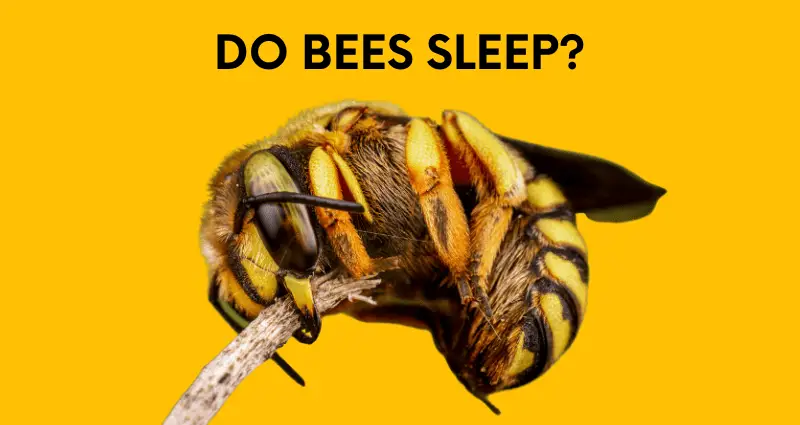The sleep habits of bees are remarkably well-documented, and there are striking similarities between honey bee and human sleep behaviors. Honey bees typically sleep in shifts at night in the hive, though a bee’s role in the colony and various other factors determine when, where, and how long a bee sleeps.
The fascinating intelligence of bees has made them the focus of several sleep and memory studies exploring such topics as:
- The reasons bees sleep
- When, where, and how bees sleep
- How long do bees sleep
- The temperature of a sleeping bee
- Light sensitivity and wakefulness among bees
- Human vs. bee sleeping habits
Let’s investigate the results of these studies and find out all there is to know about bees and sleep!
The Importance of Sleep in Bees
Just like us, bees need sufficient rest if they are to perform their daily pollinator tasks. The mistakes of a tired bee can disrupt the efficiency of an entire team of worker bees.
A sleep-deprived bee may struggle with the following:
- Memory
- Communication
- Learning new routes
Let’s have a closer look at how sleep deprivation affects bees:
Memory Retention
Sleep facilitates the learning and retention of new skills and information. This is as true for bees as it is for humans. A poorly rested bee will struggle to remember the routes and food sources it mapped and found the previous day.
‘Waggle’ Dance Disruption
Bees are eusocial creatures; they work together to raise shared young, harvest and produce food and protect their home.
This requires a great deal of cooperation and communication, and the quality and reliability of this communication are severely affected by the mistakes of an overtired bee.
Foraging bees use a waggle dance to direct their sisters toward food sources. These directions can become confused or contradictory when a tired bee gives them.
Bad directions result in a meager harvest, affecting the success of an entire foraging team.
Learning New Routes Requires More Sleep
Interestingly, the distance a foraging bee covers does not appear to correlate to the quantity of sleep the bee requires.
Additionally, a tired bee and a well-rested bee will have similar success in charting new routes back to their beehive.
However, when forager bees are forced to learn new routes to their beehive, they require far more sleep the following night.
Tired bees struggle to recall the trail they blazed the previous day when they don’t get enough sleep. Well-rested bees have no trouble remembering their way home.
How Do Bees Sleep?
Bees gather at their hive to sleep. They are generally motionless in sleep except for occasional grooming behaviors.
As sleepy bees nod off, their necks relax, and their tiny heads and backsides droop into a relaxed posture.
Does the Body Temperature of a Sleeping Bee Decrease?
When bees sleep, their body temperature drops. The temperature of a sleeping bee matches the ambient temperature where they are resting.
Nocturnal thermal imaging reveals that bees sleeping at the edges of the nest are completely undetected.
When Do Bees Sleep?
When a bee sleeps depends on its role in the colony.
Forager bees work during the day and sleep through the night. Worker and queen bees tend to catch their shut-eye when they can, depending on the demands of the task at hand.
Nurse bees (tasked with childcare) get no sleep at all! This scientific discovery about bees will, of course, be utterly unsurprising to parents of human babies.
Do Bees Detect Light and Wake Up?
The natural cycles of day and night, light and dark, determine the circadian sleep cycle of bees.
Just as with humans, disruption of these cycles leads to poor individual and bee colony health and performance.
Where Do Bees Sleep?
Where a bee sleeps depends on its age.
Older bees tend to sleep outside of honeycomb cells, in various positions about the perimeter of the nest. Younger bees cozy up inside cells, closer to the center of the hive.
How Long Do Bees Sleep?
Bees will sleep for 10-15 minutes at a time, for a total rest period of 5-8 hours in a 24 hour period.
Many factors affect how long bees sleep. For example, young bees sleep less than older forager bees, and the queen bee may snooze for several short periods during the day.
It’s not unusual for a bee to wake up around 50 times as it cycles through a night’s sleep stages. This sounds like a terrible night to us, but for bees, it’s more than sufficient beauty sleep.
Bee Sleep vs. Human Sleep
Human and bee sleep is remarkably similar. Bees and humans cycle from light naps to deep sleep, then back to light sleep again.
The sleep states of bees and humans are characterized by relative stillness and decreased alertness. And, just like us, bees dream.


